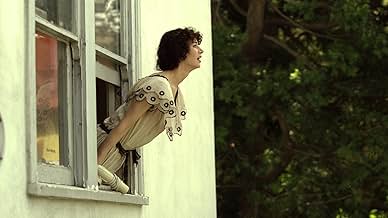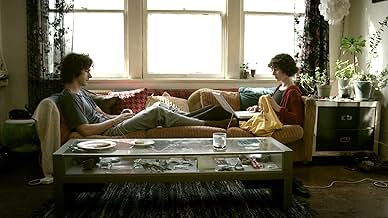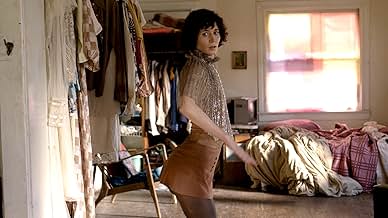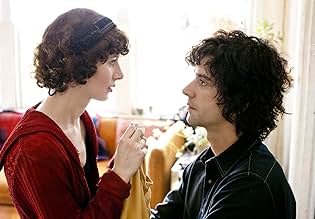The Future
- 2011
- Tous publics
- 1h 31min
Lorsqu'un couple décide d'adopter un chat errant, leur point de vue sur la vie change radicalement, modifiant littéralement le cours du temps et de l'espace et testant leur foi en l'autre et... Tout lireLorsqu'un couple décide d'adopter un chat errant, leur point de vue sur la vie change radicalement, modifiant littéralement le cours du temps et de l'espace et testant leur foi en l'autre et en eux-mêmes.Lorsqu'un couple décide d'adopter un chat errant, leur point de vue sur la vie change radicalement, modifiant littéralement le cours du temps et de l'espace et testant leur foi en l'autre et en eux-mêmes.
- Réalisation
- Scénario
- Casting principal
- Récompenses
- 1 victoire et 7 nominations au total
- Neighbor Woman
- (as Diana Sandoval)
Avis à la une
The story revolves around a couple that proposes a change in your life. They hate their jobs and the idea of adopting a cat makes it arise a new way of life. However what is proposed as a change eventually becomes routine. The fear of failure and responsibility makes the personality of both becomes complicated and often result surreal. The time is always the reason for the changes. The fear of an uncertain future and nonconformity with the present makes it parodies on numerous occasions the fact of stop the time. Specifically, the period in which Sophie and Jason are prepared to adopt a cat is the time when the personality of both becomes strange. There are surreal elements and nonsense conversations that show complex emotional states. The failure in work and routine makes Sophie feel prisoner to her feelings. The figure of Sophie has no splendor. It is a figure off and apparently weak. Her look is sad and never denotes happiness. In the same way the character of Jason is strange. He is the partner of Sophie and lives with her in a small flat and messy. His way of understanding things is similar to Sophie. Both fear the passage of time and want to be free. Marshall's character represents the freedom for Sophie. The way in which both are known is strange and simultaneously comic. Sophie looks out the window screaming and tries to listen to Marshall. The scene reflects a comparison: Sophie appears as imprisoned in her own home and as the only escape she has the window that looks out for help. The fact that the cat, paw paw, has a voice allowed to know their feelings and desires. The image is of an animal that is locked behind bars waiting for a change in his life, hoping in this case to be adopted. The comparison is similar to Sophie. Both are locked and desire freedom. The passing of time is also reflected in this character and appear feelings like frustration or even desperation to be adopted.
It's a surreal and complex film. The argument at first is easy but when the acts are performed we can see each character's feelings. We can see a lot of nonsense and abstract scenes. Adopting a pet is just an excuse for the change. I would like to highlight the rhetorical conversations about the passing of time, old age or the future. Personally I find this film hard to understand. There are many situations that make no sense as the act of talking to the moon, giving life to a shirt or the fact stop time. I think film is not made to be enjoyed, but it raises very philosophical thoughts on life. The emotional charge of the characters leads to surreal situations and even extravagant. These situations, in my opinion, have more weight than the argument itself.
When I watched the film I regretted having seen the trailer, as it gave away a lot of the key points in the story. I think this is a very good film portraying relationships between couples. I could see a lot of symbols in the film pointing at the gender stereotypes everyone is affected by as being part of a patriarchal society. I like the concept of the cat representing the union of the two people, and how Miranda shows pets in relation to the other couples in the story to show whether or not their relationship survived/withstood time. I think this film provokes thoughts and is meant to make people reflect about their relationships with others. It shows that miscommunication, fear of confrontation, fear of being ourselves, is what breaks relationships. He cannot love her if he doesn't love himself. She cannot love him if she doesn't love herself. We can't have decent relationships when we're not being honest with ourselves. Being honest with another person, loving the other person, comes second to being honest and loving yourself.
I don't understand why this film has so many negative comments in the reviews. I truly enjoyed this and hope to see Miranda continue with more projects.
But I was floored by how good it was. Perhaps due in part to my lower expectations. But I thought it was touching and poignant - and very funny (the whole theater laughed out loud a few times). I cried at the beginning, and I cried (sobbed, really, while having to cover my mouth to mute myself) at the end. I really enjoyed July and Hamish Linklater; especially Linklater, who seemed like a more accessible character while July still bordered on the wide-eyed, "unique" indie-chick stereotype. Though she did break through that enough moments in the film for me to enjoy her character. The cat monologues that I had cringed at when I read about them prior to seeing the film actually worked quite well for me.
I don't think this is a movie I'll re-watch often in The Future, but it's definitely one I think people should see at least once or twice.
The cat only appears physically once at the movie, but it has much more importance than that. In fact, it is the narrator. It helps the audience to be put into context, and it sometimes gives sense to some parts of the film that seem to be incoherent. A part from having an important leading role, it will be the one to break out the whole action; the fact of having decided to adopt it will be the turning point of a story that, at first, seemed to be set in a calm atmosphere.
Some important aspects of life are tackled. For instance, the uncertainty of the future is clearly shown. We have to assume that that is the way it is, we are in control of it, but we are not able to know about it. So, life would not be all about wanting to know more about the future, but to be ready to face what comes next. If we stop to think about the future we do not have enough time to live the present. We spend our daily life worried about the future, and what if that future does not exist?
The entire film is enveloped in an enormous pessimism. The way in which the characters act makes us predict that there is no energy in them and they are likely to lose. Instead of taking into account the advantages that life can offer to them, they only see problems around. They even see the fact of taking care of an abandoned animal as a problem, when that should be taken as a satisfaction. That offers the audience the possibility to decide if that behavior is right for you or not; it is a film that would make people think. Furthermore, it is a movie that favors self-reflection. Although the development of the movie does not make the moral to become evident, one can use the film as the starting point of a personal thought with a clear moral: It does not really matter what will happen next, we have to enjoy the everyday and make the most of it.
Although it speaks about a universal topic, there are many hints in the movie that point to our current generation. One for instance: accumulating whatever mundane knowledge on the internet, instead of sitting still and trying to think. So noughties.
I don't want to say more. If you are, let's say, in your mid 30s, urbanite, have studied liberal arts, and still struggle (or even better: wait) to define yourself, please watch this movie. You will find a part of yourself, and part of the answer to your questions.
Le saviez-vous
- AnecdotesThis started life as a performance piece for Miranda July which she expanded into a feature film.
- Citations
Jason: You know how, like in cartoons, when the building gets hit by the wrecking ball, right before the building falls down, there's always like this moment where it's perfectly still right before it collapses? We're in that moment. The wrecking ball has already hit all of this, and this is just the moment before it all falls down.
- ConnexionsEdited into 365 days, also known as a Year (2019)
- Bandes originalesSticky Buns
Written by Ryeland Allison
Performed by Ryeland Allison
[Courtesy of Silver Outlet Music America]
Meilleurs choix
- How long is The Future?Alimenté par Alexa
Détails
Box-office
- Budget
- 1 000 000 $US (estimé)
- Montant brut aux États-Unis et au Canada
- 568 662 $US
- Week-end de sortie aux États-Unis et au Canada
- 27 137 $US
- 31 juil. 2011
- Montant brut mondial
- 887 172 $US
- Durée1 heure 31 minutes
- Couleur
- Mixage
- Rapport de forme
- 1.85 : 1




































